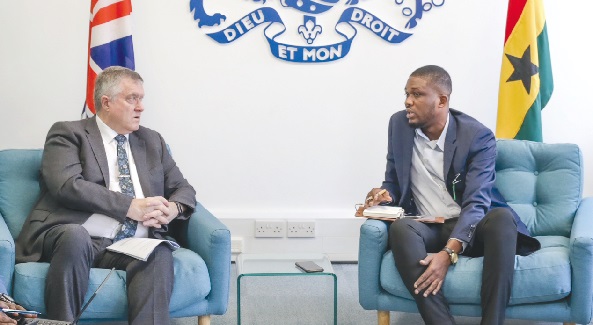
UK businesses still committed to Africa — Envoy
The exit of some major UK businesses from Africa is not a demonstration of a lack of confidence in the African market, UK Government’s Envoy for the UK-African Investment Summit, Dr Alastair Mcphail, has said.
He said UK businesses have been faced with unprecedented challenges and it was therefore normal for them to exit some countries.
Speaking in an interview with the Daily Graphic ahead of the UK-African Investment Summit, Dr Mcphail, who is currently leading a delegation of UK businesses to Ghana, said some of the companies who exited some African countries have opened up businesses in other African countries, noting that it was therefore not a lack of confidence in the African market.
The last few years have seen a number of UK businesses exit Africa, with Barclays in 2016 pulling out of Africa. Standard Chartered Bank also last year announced that it was exiting some African countries, and quite recently, Shell has also announced that it was exiting some African countries.
In Ghana, Vodafone has sold its stake in Vodafone Ghana to Telecel.
Dr Mcphail said there have been many headwinds facing UK businesses and it was only natural that businesses at a point will relook at where they do business.
“Some of these companies may have left some African countries but have opened up somewhere else in Africa. Businesses move around and its very unlikely that a business will invest at one place forever,” he stated.
Largest investor in Africa
Dr Mcphail noted that the UK was still the largest investor in Africa according to data from UNCTAD, with the trade among UK and Africa amounting to £45.3 billion in 2022.
In Ghana, trade among the two countries is around £2 billion with UK’s import from Ghana accounting for about £900 million and exports accounting for £1.1 billion.
Dr Mcphail said there was still room for improvement for UK trade and investment in Africa, particularly in some countries.
“There is so much potential in Africa, a very young population, and we think it important to increase our investments on the continent,” he said.
Post-Brexit
Commenting on how trade had fared between the UK and Africa post Brexit, he mentioned that aside from Brexit, the COVID-19 pandemic and Russia’s invasion of Ukraine have all affected trade relations between UK and Africa.
“There have been three significant events in the last years which affected trade and relationships between UK and Africa and Brexit is one of them,” he stated.
He said the UK had, however, discovered new opportunities when it comes to trade and investment in Africa post Brexit and have signed a number of new agreements with its partners in Africa and introduced some policies as well.
One of such policies is the Developing Countries Trading Scheme which cut tariffs on 99 per cent of African goods that enter the UK.
Dr Mcphail said that scheme replaced the arrangement the UK had with Africa under the European Union and it was aimed at creating an opportunity for African countries who wanted to trade with the UK.
He said that scheme was, however, still not well known in Africa and as such, a lot of businesses have failed to take advantage.
“We are currently bringing it to the attention of countries to benefit from it. We want to encourage as much economic growth as we can on the continent. “We want to look into a future where our relationships are built on trade and investments,” he said.
UK-African Investment Summit
The second edition of the UK-African Summit which is scheduled for April this year, would be a two way event that would seek to explore trade and Investment opportunities between the UK and Africa.
The summit, which would be hosted by the UK Prime Minister, will bring together 25 African countries.
Dr Mcphail said the maiden edition of the summit generated £6.5 billion worth of deals and was hopeful that this year’s edition would be more successful.
He said the summit would create opportunities for business to business contacts, business to government and government to government.
“The reason we have chosen 25 countries rather than all 54 countries is that this is not about the totality of our relationship with Africa but about trade and investments so the 25 countries are the ones with which we do the most business and we think to have an investment focus summit with these countries will be beneficial to both sides,” he explained.